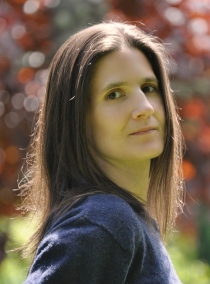 The other day, I went to Curriculum Night at my teenage son's middle school, and I happened to talk with some girls in his language arts class about books. I asked them what they liked to read and I got the answers I expected - Divergent, The Hunger Games - but out of curiosity, I asked, "What about historical fiction?"
One girl wrinkled her nose. "No. Ew."
I couldn't resist. "Why not?"
Another girl was more tactful. "You know. School."
Yes, I do know. And I don't blame anyone raised on "social studies" and sanitized school-friendly history for that reaction. But if you like dystopian secondary worlds like these girls seemed to, let me tell you something: the best-kept secret about history is that the past is the ultimate secondary world.
You can't get more dystopian than the rubber plantations in the Belgian Congo where they'd cut off people's hands and kidnap their families to ensure that quotas were met, or the transportation of petty criminals to a prison colony on the other side of the planet. These things are real, and they give fiction a run for its money every time.
Here's a little quiz: which of the following are plot summaries of recent YA novels, and which are actual historical events?
* The daughter of a gladiator must marry the fighter who kills her father and captures her dowry bracelet.
* When her wealthy husband dies, a teenage widow must climb on his funeral pyre with him and be burned alive, or else face recrimination, ostracism and destitution.
* During a seemingly unstoppable plague, a city closes its gates and forbids anyone to enter or leave, and any houses in which plague suffers already live are boarded up with the healthy and sick alike trapped inside.
* Girls who reach legal maturity are given a special tattoo that indicates their sexual availability to the entire society.
Answers:
1 - Dystopian (Girl in the Arena by Lise Haines)
2 - Historical (pre-British India; the practice of sati)
3 - Historical (14th century Milan)
4 - Dystopian (XVI by Julia Carr)
Even if you got all the answers right, it's hard to ignore the fact that the similarities between the past and fictional secondary worlds are striking. Our shared human past is filled with betrayal and revenge and despair and joy and stupidity, and one of the best ways to access it is through well-crafted, well-researched, engaging fiction.
The best historical fiction challenges readers' assumptions about what "history" is, and how we in the present relate to people who lived the past. It doesn't judge the past based on our modern standards, but it renders the past - where women were property and animal cruelty was funny - normal and familiar. It's the same challenge faced by writers who set stories in other types of secondary worlds, but historical-fiction writers have the additional hurdle of social studies to overcome. But the best historical fiction tells a good story, too, where characters we care about have to deal with some type of issue that feels relatable. It's not just a chronicle of the stuff that happened. So much of history is interpretation. The narrative has to take evidence into account, but at its heart it's still a narrative.
The best historical fiction is out there, and it ain't social studies. There are echoes of the dystopian and traces of the stranger-than-fiction. There is tragedy and adversity and also hope, because it is human. The best historical fiction may surprise you.
J. Anderson Coats has dug for crystals, held Lewis and Clark's original hand-written journal and been a mile underground. She writes historical fiction set in the middle ages that routinely includes too much violence, name-calling and petty vandalism perpetrated by badly-behaved young people. Her work is represented by Ammi-Joan Paquette of the Erin Murphy Literary Agency. The Wicked and the Just, J.'s debut novel, is forthcoming from Houghton Mifflin Harcourt in April 2012. J. lives within walking distance of the Puget Sound with her husband, teenage son and a cat with thumbs.
| 



5 comments:
Great points! I'm a huge lover of historical fiction, but I never liked history when I was a student because it's only interesting to me when it's a STORY! Those YA plotlines are especially intriguing--now to spread the word about what historical fiction REALLY is.
I LOVE THIS! Our kids are getting such a sanitized view of history because schools are learning to shy away from controversy - even cancelling Halloween celebrations because they might offend someone. (Who? Christians? Pagans? Pumpkins?)
The bottom line is, the best way to understand someone else's life, concerns and culture is to live with them and the best way to do that (short of traveling there) is in a book.
Great blog post! :)
I love history and I found this intriguing.
Cool post!! Nice blog too!! Keep up the good work!! You are invited to check out or follow my blog anytime!! Have a great day!!!
Post a Comment